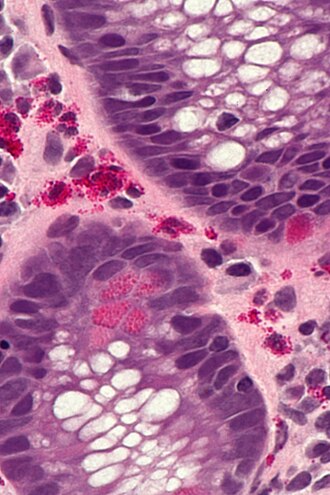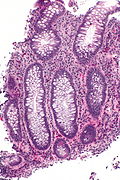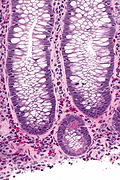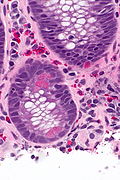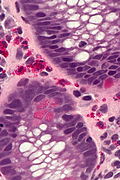Difference between revisions of "Paneth cell"
Jump to navigation
Jump to search
| (13 intermediate revisions by the same user not shown) | |||
| Line 1: | Line 1: | ||
[[Image: Paneth cell metaplasia in the left colon -- extremely high mag.jpg | thumb | right |Paneth cell metaplasia and lamina propria [[eosinophil]]s. [[H&E stain]]. ]] | |||
The '''Paneth cell''' is characteristic of the [[small intestine]]. It is also normal in the [[cecum]], ascending colon and transverse colon. | The '''Paneth cell''' is characteristic of the [[small intestine]]. It is also normal in the [[cecum]], ascending colon and transverse colon. | ||
'''Paneth cell metaplasia''', abbreviated '''PCM''', redirects to this article. | |||
==General== | ==General== | ||
* | *Paneth cells should ''not'' be in the left colon.<ref name=pmid11851832>{{cite journal |author=Tanaka M, Saito H, Kusumi T, ''et al'' |title=Spatial distribution and histogenesis of colorectal Paneth cell metaplasia in idiopathic inflammatory bowel disease |journal=J. Gastroenterol. Hepatol. |volume=16 |issue=12 |pages=1353–9 |year=2001 |month=December |pmid=11851832 |doi= |url=http://www3.interscience.wiley.com/resolve/openurl?genre=article&sid=nlm:pubmed&issn=0815-9319&date=2001&volume=16&issue=12&spage=1353}}</ref> | ||
** | **If you see 'em there it is '''Paneth cell metaplasia'''. | ||
===Paneth cell metaplasia=== | |||
If PCM is present: | |||
*Think of [[inflammatory bowel disease]] and other long-standing injurious processes. | |||
*PCM in the context of colorectal adenomas may be associated with a higher risk of colorectal neoplasia.<ref name=pmid23232853>{{Cite journal | last1 = Pai | first1 = RK. | last2 = Rybicki | first2 = LA. | last3 = Goldblum | first3 = JR. | last4 = Shen | first4 = B. | last5 = Xiao | first5 = SY. | last6 = Liu | first6 = X. | title = Paneth cells in colonic adenomas: association with male sex and adenoma burden. | journal = Am J Surg Pathol | volume = 37 | issue = 1 | pages = 98-103 | month = Jan | year = 2013 | doi = 10.1097/PAS.0b013e318267b02e | PMID = 23232853 }}</ref> | |||
==Microscopic== | ==Microscopic== | ||
| Line 13: | Line 21: | ||
**Subnuclear eosinophilic granules. | **Subnuclear eosinophilic granules. | ||
*Intraepithelial [[eosinophil]]s. | *Intraepithelial [[eosinophil]]s. | ||
**Eosinophils have smaller (~1/2) more intensely red granules. | |||
===Images=== | |||
<gallery> | |||
Image: Paneth cell metaplasia in the left colon -- intermed mag.jpg | PCM - intermed. mag. (WC) | |||
Image: Paneth cell metaplasia in the left colon -- high mag.jpg | PCM - high mag. (WC) | |||
Image: Paneth cell metaplasia in the left colon -- very high mag.jpg | PCM - very high mag. (WC) | |||
Image: Paneth cell metaplasia in the left colon -- extremely high mag.jpg | PCM - extremely high mag. (WC) | |||
</gallery> | |||
==IHC== | |||
*Lysozyme +ve.<ref name=pmid12655793>{{cite journal |author=Rubio CA, Nesi G |title=A simple method to demonstrate normal and metaplastic Paneth cells in tissue sections |journal=In Vivo |volume=17 |issue=1 |pages=67–71 |year=2003 |pmid=12655793 |doi= |url=}}</ref> | |||
==See also== | ==See also== | ||
*[[Gastrointestinal pathology]]. | *[[Gastrointestinal pathology]]. | ||
*[[Inflammatory bowel disease]]. | |||
*[[Colon]]. | *[[Colon]]. | ||
*[[Paneth cell-like change of the prostate gland]]. | |||
==References== | |||
{{Reflist|2}} | |||
[[Category:Basics]] | [[Category:Basics]] | ||
Latest revision as of 16:06, 27 December 2016
The Paneth cell is characteristic of the small intestine. It is also normal in the cecum, ascending colon and transverse colon.
Paneth cell metaplasia, abbreviated PCM, redirects to this article.
General
- Paneth cells should not be in the left colon.[1]
- If you see 'em there it is Paneth cell metaplasia.
Paneth cell metaplasia
If PCM is present:
- Think of inflammatory bowel disease and other long-standing injurious processes.
- PCM in the context of colorectal adenomas may be associated with a higher risk of colorectal neoplasia.[2]
Microscopic
Features:
- Supranuclear eosinophilic granules.
DDx:
- Enterochromaffin cells (AKA Kulchitsky cells).
- Subnuclear eosinophilic granules.
- Intraepithelial eosinophils.
- Eosinophils have smaller (~1/2) more intensely red granules.
Images
IHC
- Lysozyme +ve.[3]
See also
- Gastrointestinal pathology.
- Inflammatory bowel disease.
- Colon.
- Paneth cell-like change of the prostate gland.
References
- ↑ Tanaka M, Saito H, Kusumi T, et al (December 2001). "Spatial distribution and histogenesis of colorectal Paneth cell metaplasia in idiopathic inflammatory bowel disease". J. Gastroenterol. Hepatol. 16 (12): 1353–9. PMID 11851832. http://www3.interscience.wiley.com/resolve/openurl?genre=article&sid=nlm:pubmed&issn=0815-9319&date=2001&volume=16&issue=12&spage=1353.
- ↑ Pai, RK.; Rybicki, LA.; Goldblum, JR.; Shen, B.; Xiao, SY.; Liu, X. (Jan 2013). "Paneth cells in colonic adenomas: association with male sex and adenoma burden.". Am J Surg Pathol 37 (1): 98-103. doi:10.1097/PAS.0b013e318267b02e. PMID 23232853.
- ↑ Rubio CA, Nesi G (2003). "A simple method to demonstrate normal and metaplastic Paneth cells in tissue sections". In Vivo 17 (1): 67–71. PMID 12655793.
